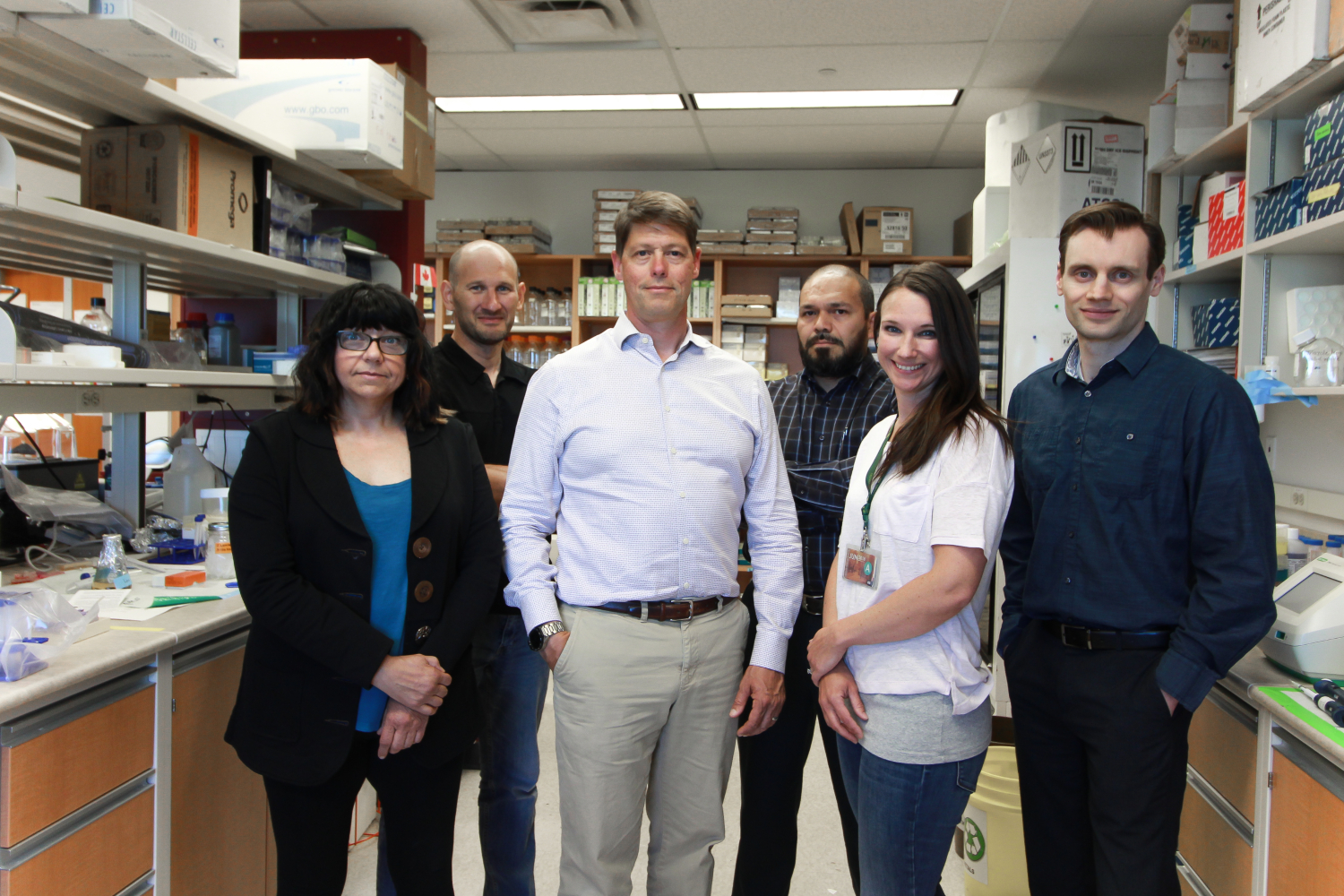
John Lewis (third left) and his team.
1. Putting the brakes on metastatic cancer
Cancer Research Institute of Northern Alberta (CRINA) member John Lewis and his experimental oncology research team identified 11 genes linked with the spread of cancer cells, offering great potential for novel cancer therapies.
2. Does your gut hold the key to unlock the mystery of MS?
University of Alberta multiple sclerosis (MS) researchers are looking to the gut to find new ways to prevent and treat the inflammation and neurodegeneration associated with the disease. This topic was a main focus of discussion for world-leading MS experts at the MS Centre Research Symposium on May 4 at the University of Alberta.
3. Richard Fedorak: Builder of excellence in service of the people
Colleagues, friends, mentors and trainees remembered our late Dean Richard Fedorak as one of the giants of the Faculty of Medicine & Dentistry. Fedorak passed away on November 8 after a valiant fight against cancer. He is survived by his wife, Karen, and their children, Kristin and Bryan.
4. MD AIDE breaks down barriers to medical education
Medical students Alexander Wong and Emily Fong led the MD Admissions Initiative for Diversity & Equity (MD AIDE), a project to increase diversity in the MD program and remove barriers to taking the Medical College Admission Test (MCAT). The program is a collaboration with the Undergraduate Medical Education Office, the Indigenous Health Initiatives Program within the Division of Community Engagement, the Medical Students' Association and the Office of Equity, Diversity and Inclusion.
5. Indigenous students top priority in University of Alberta's medical school
The University of Alberta redressed historic limitations on Indigenous student admissions to medical school through the Indigenous Health Initiatives Program (IHIP) process. During the next admissions application cycle, starting in fall 2019, all Indigenous students who meet eligibility requirements through IHIP will be offered a place in medical school. Beginning in September, 2019 and for each of the next four years, the MD program will award four new full-tuition scholarships to entering Indigenous students.
6. Discovery shines light on the mystery of cell death in MS
Christopher Power, professor of medicine in the Division of Neurology, Neuroscience and Mental Health Institute member and Vice-Dean, Research, with PhD candidate Brienne McKenzie discovered a unique process of brain cell death that affects the most vulnerable cells in multiple sclerosis (MS). This process can be blocked by an anti-inflammatory drug, giving hope to MS patients everywhere.
7. Family fights against preventable opioid deaths
Petra and Richard Schulz lost their son Danny in 2014 after an accidental fentanyl overdose. They shared their story at a public lecture hosted by the Neuroscience and Mental Health Institute about the opioid crisis and harm reduction on March 15, as part of Brain Awareness Week 2018.
8. The race for the perfect 'match'
Hundreds of Canadian medical students enter the Canadian Resident Matching Service (CaRMS) every year for a spot in residency specialty programs. Melanie Lewis, associate dean, Advocacy & Wellbeing, highlights how the U of A is leading the charge to increase match success rates for medical graduates.
9. How can harnessing storytelling improve health care for Albertans?
Verna Yiu, president and CEO of Alberta Health Services and pediatrics professor in the Faculty of Medicine & Dentistry, thinks the art of medicine and healing isn't about technology, but the human-to-human interactions. Yiu shared her insights at the public lecture "The Power of Storytelling to Improve Healthcare" presented by the Arts & Humanities in Health & Medicine program in January 2018.
Clinician, Cancer Research Institute of Northern Alberta (CRINA) member and assistant professor of oncology Michael Chu works on innovative ways to treat blood cancers from the inside of the body, with the help of two generous supporters who gave a boost to his research.